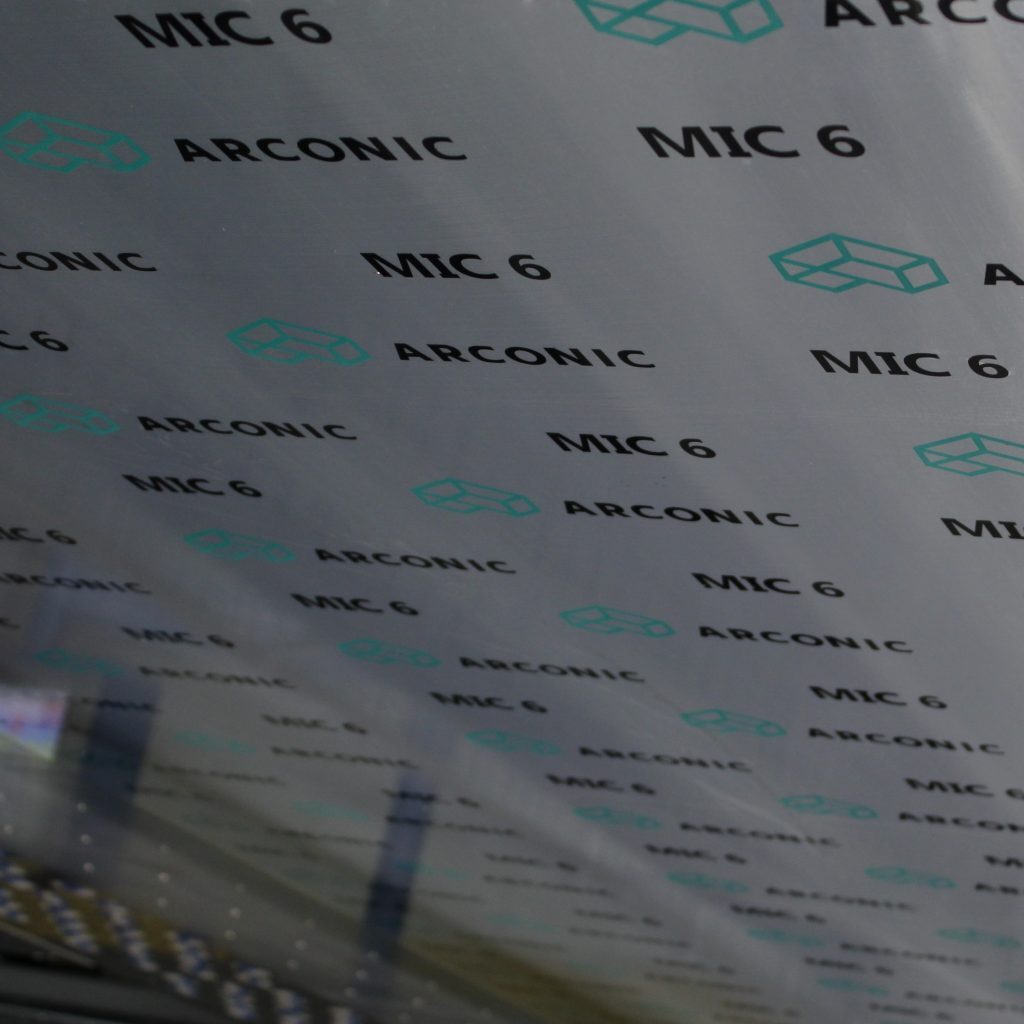Home » Aluminum » Cast Plate » Mic 6 Aluminum Cast Tool & Jig Plate
How is Mic 6® made?
As previously mentioned, stability is one of the major defining characteristics of MIC 6® aluminium cast tool & jig plate. The manufacturing process of Mic-6® is unique. The state-of-the-art process begins by casting the plates continuously and to a near net thickness. The optimum in molten metal cleanliness has been achieved by the continuous application of SNIF degassing and impurity removal technology to every MIC-6® plate that is cast.

Mic 6®: The Flattest Cast Tool & Jig Plate
Smooth and even. Without lumps or indentations. Level. Horizontal. All of these are ways to describe flatness. In the world of aluminum cast tool and jig plate, there is another way to describe flatness: Mic 6® cast tool and jig plate. Touting “the most advanced process used in the cast plate industry”, all thicknesses of Mic 6 cast tool and jig plate are produced to exceptional flatness tolerances. Thicknesses of .25” to .625” (6 mm and over) have a maximum thickness variation of .015”. The thicker plates, .75” (19 mm) and over are produced to thickness variations of no greater than .005”. Arconic measures these flatness tolerances using a laser system on a granite flatness table in the mill. Not only are these tight tolerances guaranteed in parent form, but Arconic also guarantees these tolerances in cut pieces as well. When proper cutting techniques and equipment are used to cut MIC 6® cast tool and jig plate, these tight flatness tolerances will still be guaranteed. When your parts have to be flat, Mic6 cast tooling plate has your back.
Thickness Tolerances & Surface Condition
As previously mentioned, Mic 6’s last stop in the production process is surface finishing. Each near net cast plate is surface machined, on both the top and bottom, to remove any surface imperfections. Moreover, this final step also results in thickness tolerances of ±.005”/±.127 mm on every thickness, 6 mm to 4.0”. Before mill exit, each and every single plate is inspected to verify both the thickness as well as the flatness. This dedication to providing a quality product, on every shipment, is why Arconic’s Mic 6® is still considered by many to be the standard in aluminum cast plate.
Why Do Machinists Prefer Mic-6® to Other Cast Plate Products?
With a cast tool and jig plate that guarantees such consistent performance and quality, it is no wonder that it finds itself into a variety of applications. Because of the stringent quality controls in place at Arconic, MIC 6® allows for down-stream processing with precise control of tolerances and dimensions. This aluminum cast plate is a free cutting alloy that produces small, uniform chips in a variety of high speed operations. Customers can perform extensive machining routines involving metal removal with minimal risk of distortion. With such high standards and exceptional performance, Arconic has created a very loyal cast tool and jig plate customer base.
MIC 6® can be used for a variety of applications, such as:
- Automotive Tooling
- Base Plates, Side Plates, Indexing Tables
- CNC Routing Tables
- Chip Printers
- Circuit Printers
- Dielectrics
- Fixtures
- Food processing
- Packaging & Printing Equipment
- Semi-conductor Holding trays
Aluminum Cast Tooling & Jig Plate
It is said that imitation is the highest form of flattery. In the world of cast aluminum tool and jig plate, this statement proves true. Whether you call it CT&J plate, cast plate, jig plate, cast tooling plate, aluminium tooling plate or anything similar, there are other mills who offer these product lines. Though comparable, none have the reputation and performance of the flatness and stability offered by MIC 6.
Other Cast Aluminum Products Include:
Alca 5™ a registered trademark of PCP Aluminum (Sold by Howard Precision Metals)
Alpase K100-S® is a registered trademark of TST, Inc (Flatness not equal to MIC 6)
Vista Metals ATP 5™ is a registered trademark of Vista Metals Corp.
Alimex ACP 5080™ is a registered trademark of Alimex, Germany.
Formodal 030™ is a registered trademark of Bikar Metal of Germany.
On-Hand Inventory of Mic 6®
Howard Precision Metals offers Arconic’s Mic 6® cast aluminum jig plate from stock. Parent plates are produced in standard 36.5, 48.5, & 60.5 inch widths x 144.5 inch long, with the maximum width Mic-6® a 60.5″ width. This width limitation is due to its continuous casting manufacturing method. If you need wider cast tool and jig plates, we also offer PCP’s Alca 5, which is available in width as great as 96″. If a standard size is not what you need, we have you covered. Mic-6® cast plate can be special ordered to a custom thickness, width, or length with a minimum run of only 2000# and lead time of approximately 3-4 weeks. Because such a large percentage of MIC 6 is produced from aerospace plate scrap, only nominal certs are available. At Howard Precision, we not only carry US standard thicknesses, but also a nice selection of metric thicknesses in our standard stock. Please see our stock list for available MM Mic 6 sizes.
Mic 6® Aluminum Cast Plate Mechanical Properties
Mic 6 aluminum plate specs include mechanical and physical properties.
Mechanical Mic 6 aluminum properties are as follows:
- Yield Strength: 105 MPa, 15200 psi
- Tensile Strength: 165 MPa, 23900 psi
- Modulus of Elasticity, ksi: 71.0 GPa, 10300 KSI
- Elongation at Break: 3%
- Density: 2.7 g/cm3, 0.101 lb/in3
- Harness Brinell: 65
Please Note:
The technical data provided above is only for informational purposes and not design purposes. It is not guaranteed or warranted.
Mic 6® Cast Plate Aluminum Physical Properties
Physical Mic 6 aluminum properties are as follows:
- Coefficient of Thermal Expansion: 13.1 µin/in-°F 20-100°C, 68-212°F
- Coefficient of Thermal Expansion: 13.6 µin/in-°F 20-200°C, 38-392°F
- Thermal Conductivity: 985 Btu-in/hr-ft²-°F, 142 W/m-K
- Volume Resistivity, Ω-cm: 0.00000479
Please Note:
The technical data provided above is only for informational purposes and not design purposes. It is not guaranteed or warranted.
Machining Mic 6 Cast Aluminum Plate
Some of the techniques used to machine Mic 6 aluminum plate offered by a Mic 6 aluminum distributor and produce high quality aluminum pieces, include vertical milling, horizontal milling, shaping and planning, and circular sawing. Mic 6 aluminum is highly stable. It is also exceptionally horizontal and level, without bumps or indentations, with a very appealing surface finish.
Mic 6 is manufactured with recycled 7xxx series aerospace plate.
- Lengths: 96.5”/120.5”/144.5”
- Widths: 36.5”/48.5”/60.5”
- Thickness: .25 to 4.0”
Mic 6 Aluminum Tooling Plate Tolerances
With proper machining methods applied, tolerances of Mic 6 aluminum tooling plate can be consistently maintained in the thousandths. The aluminum plate is finished to 20 micro-inches usually on each side. From nominal on 1/4 to 4”, thickness tolerances are within .005”
Flatness Tolerances:
- 1/4″ to 5/8” Within .015”
- 3/4” and Greater Within .005”


